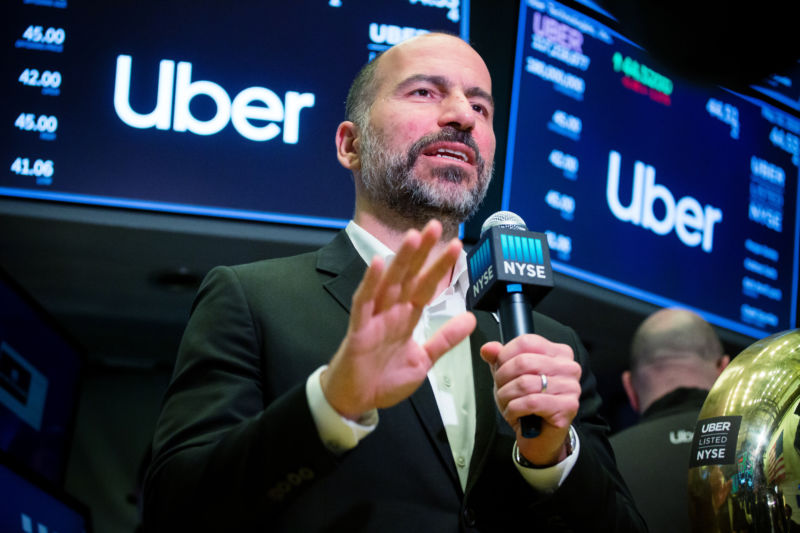
Uber’s long-anticipated debut on public stock markets failed to live up to expectations on Friday, with the company’s stock falling 7.6 percent during its first day of trading. As the closing bell rang, Uber’s stock was worth $41.57, valuing the entire firm at $76 billion.
Uber has suffered from steadily diminishing expectations in recent months. When Uber solicited proposals from banks to handle the massive stock offering, some banks reportedly estimated that the company could be worth as much as $120 billion. By the time Uber’s shares actually went on sale, the company was seeking a more modest $82 billion. Now the company isn’t worth even that much.
Still, Uber raised $8.1 billion in the initial public offering, replenishing the company’s warchest. That’s important because Uber has yet to turn a profit. In fact, Uber reportedly lost more than $1 billion in each of the last three quarters.
Uber’s new valuation makes Travis Kalanick, Uber’s founder and former CEO, worth $4.9 billion. At least two other Uber insiders, Garrett Camp and Ryan Graves, have become billionaires from their Uber holdings.
Uber’s $76 billion valuation also provides something of a vindication for those who invested in Uber during previous years. A lot of observers scoffed when investors valued Uber at $17 billion during a 2014 fundraising round. They scoffed even more when the company was valued at $62.5 billion in 2015. Yet despite a series of setbacks over the last three years—and despite a steady string of money-losing quarters—Wall Street now believes the company is worth around $76 billion.
Perennial price war
Uber’s IPO comes weeks after its leading US rival, Lyft, debuted its stock in late March. On paper, Lyft lost $1.1 billion in the first quarter of 2019—though the company says that mostly reflects a one-time cost from employees cashing in their stock options. Ignoring those and other one-time losses, Lyft says it lost $211 million in the first quarter of 2019. That’s still a lot of red ink for a company whose revenues are a lot smaller than Uber’s.
Lyft’s shares have been battered since the company debuted on public markets in late March. The company was valued at more than $22 billion on its first day of trading. But the stock has since fallen 34 percent to $14 billion. That includes a 7% decline on Friday, as the poor performance of Uber’s stock seems to have spooked Lyft shareholders.
The two companies keep losing money because they’re locked in a bitter, years-long price war. Each company has been under-charging for rides in an effort to gain market share from its rival. Yet with both companies slashing prices, the result has been a lot of red ink but little change in relative market position. Uber remains a much bigger company, but Lyft controls a significant share of the market in the cities where it operates.
Presumably at some point growth will level off, investors will get tired of red ink, and the companies will have to charge more money for their services. Investors hope that at this point, they’ll settle into a comfortable—and highly profitable—duopoly. But given the rapid pace of technological change—including the expected introduction of self-driving cars over the next decade—that seems like a fairly risky bet.
